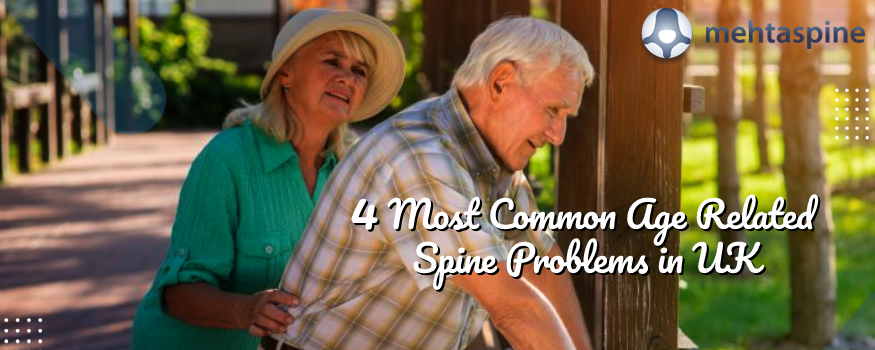4 Most Common Age Related Spine Problems in UK
A marvellous collection of bones, muscles, discs and the spine is a robust structure that forms the backbone of every movement and function of the body. Unfortunately, it is also the structure that comes with a limited warranty when it is not adequately taken care of. This is the reason why back pain is the most common ailment that every individual goes through at some point of time in their life.
Age-Related Spine Changes & Their Impact on Spine Health:
The spine that has tolerated every physical mishap slowly begins to give up as we age. Those abrupt movements or sudden pivots call for muscle strain, tension or spasms putting you out of work for a few days at least. In rare cases, the spine may begin to degenerate leading to chronic back pain that can lead to a drastic reduction in quality of life.
“Fortunately there are treatments for back pain caused by age-relate spine problems, but prevention is always better than cure”, says a spine care specialist in UK Mr Jwalant S Mehta. The first step towards prevention is to improve awareness about age-related spine problems and their causes to ensure proper spinal care.
According to spine care specialist, Jwalant S Mehta here are the common age-related spinal problems that are commonly experienced by patients in the UK:
Degenerative disc disease:
Spinal discs are the cushion that is set between two vertebrae (bones that are stacked to make the spine). As we get older these discs may get worn down leading to the bones rubbing on each other to cause intermittent back pain.
Pain that worsens with lifting or sitting, pain radiating to the lower back and buttocks, and numbness or tingling sensation in arms or legs are some of the common symptoms. Every individual above age 40 suffers some kind of degeneration but physically demanding jobs, obesity, and smoking may accelerate the onset.
Spinal Osteoporosis: Osteoporosis is a common age-related condition where an individual slowly loses the density of bone – every one of us does. Lowered bone density means weak, brittle spinal bones with lowered bone mass which ultimately increases the risk of hunched posture, fracture or injuries.
It can be hard to identify since this condition doesn’t show up any symptoms. Adopting a regular well-balanced diet along with low-impact exercise like walking, and running can slow down the deterioration.
Slipped spinal discs: The spinal disc is made up of a soft gelatinous-like substance which resides inside the tough outer ring. Spinal injury or weakness may push the soft substance to protrude outside, compressing the spinal nerves in the process. This results in numbness, pain, and discomfort and may even need surgery for treatment. Individuals with age-related spinal problems like degenerated disc diseases are more prone to slipped spinal disc problems.
Spinal stenosis:
Like the degeneration of spinal discs, the spinal canal which houses the spinal cord may degenerate too as we age. The space through which the spinal cord runs down the back may narrow, over time-pinching the spinal nerves or spinal cord in the process. Neck pain, numbness, problems with the bladder or bowel, and weakness or tingling in the leg, arm or foot are some of the common symptoms of spinal stenosis. Age-related spinal degeneration which ultimately leads to a herniated disc, spinal tumours or injuries may lead to spinal stenosis.
The risk of all the above four age-related spine problems can be cut down dramatically with a well-balanced diet, regular exercise and making healthy lifestyle choices (avoid smoking). It’s never too late to take care of yourself. Treat your spine well and repays your back with a pain-free life.
In case you need more information on spinal health or need help in managing your back pain, you can contact Children & Adult Spinal Surgeon in UK Mr Jwalant S Mehta .


